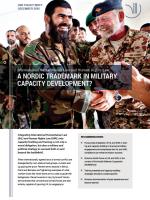Ignoring the laws of armed conflict is poor strategy
In recent decades Nordic troops have often been deployed into areas where the needs are endless and everything is a priority. The main focus in these situations has understandably been to fulfil the stated military objectives and build the capacity of the local security forces while ensuring force protection. Capacity building has often focused on basic training including shooting, patrolling, and command and control.
This order of priority is hardly surprising when ambitious military objectives are to be met under the constraints of tight troop ceilings often in inhospitable and unsafe areas of operation. It does however beg the question whether we can justify strengthening military capabilities of security authorities with flawed International Humanitarian Law (IHL) and International Human Rights Law (IHRL) track records?
In this policy brief Kristoffer Nilaus Tarp and Mikkel Runge Olesen argue that IHL and IHRL must be integrated from the onset in training and capacity building efforts in all international military engagements. This requires sustained focus from the capital level through the issuance of directives and requirements for reporting on progress. The paper also recommends promoting IHL and IHRL capacity building as a common Nordic priority as well as developing fit-for-purpose training and capacity building resources.
DIIS Experts



